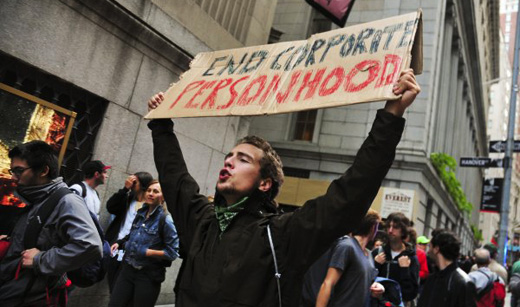
“. . . corporations have no consciences, no beliefs, no feelings, no thoughts, no desires. Corporations help structure and facilitate the activities of human beings, to be sure, and their ‘personhood’ often serves as a useful legal fiction. But they are not themselves members of “We the People” by whom and for whom our Constitution was established.”
~Supreme Court Justice Stevens, January 2010
In this age of extremist politics, there seems to be very little that political parties agree upon across the board. Conservatives have set their sights on ‘making America great again’ while left-leaning progressives never fail to remind those around them that they “feel the Bern.” Yet, there is an underlying similarity among both “Berners” and “Trumpeteers” as both their campaigns are mobilized by a mutual outrage and opposition to insider politics.
Due to voters’ wariness of Wall Street ‘elites’ it comes as no surprise that there exists support for the elimination of corporate personhood on both ends of the political spectrum. Move To Amend is just one of many organizations working to overturn the Citizens United ruling, which the Supreme Court decided in 2010, granting Constitutional protection for limitless political spending as a form of free speech. We The People defines itself as transpartisan- they view the issues of corporate personhood beyond the Democratic-Republican dyad. One of the major campaigns they have been advocating is the ‘We The People‘ amendment — a house joint resolution introduced April of 2015– which brings attention to the wording of the US Constitution as unequivocally stating “inalienable rights belong to human beings only.” Additionally, it highlights the fact that money is not a form of protected free speech under the First Amendment, and that it can be regulated in political campaigns.
Ridding the system of money in politics has become a significant factor in the ongoing presidential election cycle. Candidates like Sanders and Trump both have boasted that their electoral platforms are individually funded; Sanders has continued to raise an astonishing number of individual donations, with about $75 million raised by small contributions. Trump, on the other hand, has matched those efforts by releasing public records showing that he is the primary self-funder in his campaign. The distrust of big business by the American voters has become more prevalent over the course of the impending election as a result of the Wall Street contributions that drive politicians to the top of the polls. It is a strong indicator of the sentiments being echoed by working class citizens, whose electoral efforts have long been overshadowed by Super PACs.
Keyan Bliss, communications coordinator for the Move to Amend campaign, spoke with People’s World, saying the campaign originally started with just 12 people in a living room on the day of the Citizens United decision. “The campaign” was organized as a demand to reverse this decision,” Bliss said.
Since then, Move to Amend has grown exponentially; hundreds of thousands of individuals have demonstrated their interest in ending corporate rule and building a vibrant democracy that is accountable to the people. They have accumulated over 404,318 signatures on their motion to amend the U.S. Constitution, and acquired over 72,000 likes on Facebook.
It appears that Move to Amend has struck a chord with American voters, who have been calling for more overall accountability and legislative transparency. Kent Greenfield, from The Atlantic, pointed out that there are other similar organizations rallying to challenge the politics of corporate identities. He notes that, “Public Citizen-the liberal litigation group founded by Ralph Nader- also argues that rights protected by the Constitution were intended for natural people. (Free Speech for People, one of the groups most influential in the anti-personhood movement, is pushing a “People’s Rights Amendment – as well as a variety of other organizations to the anti-personhood project-MoveOn, Sierra Club and NAACP chapters, and United Steelworkers (USW) and SEIU locals.)
While Move to Amend holds similar long term goals, the organization sets itself apart from the pack by looking beyond the Citizens United ruling. They believe that in order to truly challenge the role of money in politics, one must first dismantle systems of oppression, and specifically address issues within sections of the population that were initially left out of the Constitution. When originally drafted in 1787, the Constitution considered just 10-20 percent of the population as being worthy of legal protection. It excluded slaves, indigenous communities, immigrants, women and other non-property owners. Since then, it has been amended 27 times — but even with those changes it continues to need substantial revisions.
Since Move to Amend launched in 2010, the campaign’s leaders have managed to pass local resolutions in over 600 cities and towns across the United States. They have also helped 16 state legislatures pass resolutions in support of an amendment, and passed referenda in support of the amendment at the ballot box in over 300 jurisdictions–in both conservative and liberal areas. Bliss described Move to Amend’s transpartisan appeal in local communities. “You look at places like Breckesville, Ohio – which voted for Mitt Romney in 2012- where we were able to pass one of our resolutions with a margin of over 70%,” he said. These actions were made possible, not just by the organization, but by the local groups and individuals who lobby state legislators to push for the amendment.
While ending corporate personhood is key to re-envisioning a new Constitution, Bliss emphasizes that it is not the end of the road, “We view this not as a race to the finish, but as a marathon. We don’t believe this is going to happen necessarily overnight.” In the meantime, Move to Amend continues to rally legislators and organizations to publicly support the “We the People” amendment. Despite the long challenge ahead, Bliss remains confident that ending corporate personhood can unify a drastically divided Congress, and revolutionize a nation that is being held hostage under the domination of the one percent. “When I talk to Republicans or Democrats and I tell them that constitutional rights belong to natural persons – everyone is on board. It’s common sense, whether you are conservative, liberal, libertarian, green, or independent.”
Photo: Thirteen.org

MOST POPULAR TODAY


Zionist organizations leading campaign to stop ceasefire resolutions in D.C. area

Communist Karol Cariola elected president of Chile’s legislature

Afghanistan’s socialist years: The promising future killed off by U.S. imperialism

‘Pender Denton—Outlaw’: An affecting, understated Old West gay love story






Comments